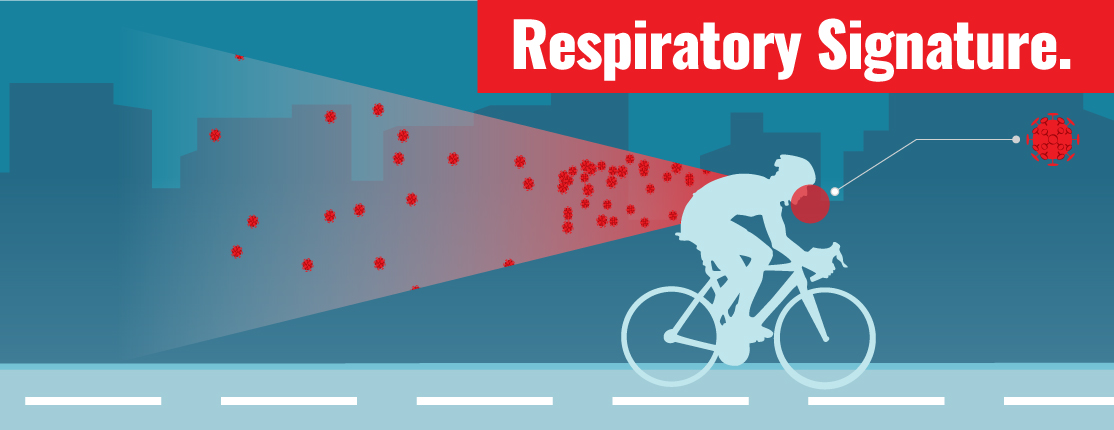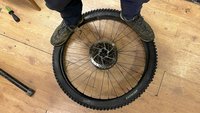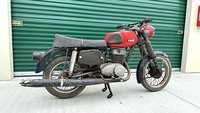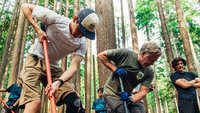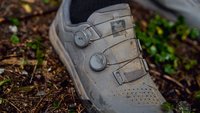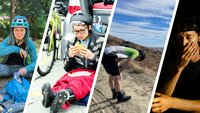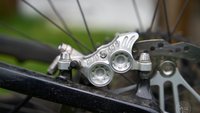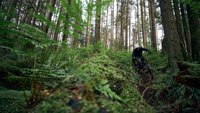DNV has a roadblock on Indian River. No MTBs, local traffic only.
North Shore Trail Riding Etiquette and Behavior in a Global Pandemic
Came thru headwaters on way back from gravel ride. Dempsey and Lynn Valley road around EOL was a shitshow. Cars parked for miles.
Posted by: Brocklanders
Posted by: JBV
Posted by: craw
https://www.bikeirvine.org/news/2020/4/1/riding-in-the-time-of-covid-19
so this is how we all get the cold, the flu, etc? is this conjecture or fact? because if it's not fact, it's fucking terrorism.
WHO says no. It's not airborne like this. Although I wouldn't chance it.
In the absence of peer-reviewed work on this virus, we have Facebook I guess. Make of this what you will, credibility is hard to judge when things are developing as quickly as they are.
A neurologist friend and one of the most intelligent and free-thinking people I know referred me to this critique by an immunologist (virologist?) of the now somewhat infamous "Belgan-Dutch Study" that paints a similar picture to what the Bike Irvine gal has painted.
https://www.facebook.com/jenniferkastenmd/posts/120574959595451
"1) Critiquing the "Belgian-Dutch Study: Why in times of COVID-19 you should not walk/run/bike close to each other" (what's the infectious dose for COVID anyway, and why 6' is necessary, but 30 is overkill); 2) How that idea of infectious dose dictates how we can interact with the world/food/people/mail/things other people have touched.
There was an ominous-sounding blog post stating that any form of outdoor exercise where you pass within 30 feet of another person will lead to transmission of COVID-19. It was written by Jurgen Thoelen, a Belgian expat in Russia who works in cloud computing, and who also founded a sports training agency. He got the information from an interview given to a Brussels newspaper by Bert Blocken, an engineering researcher interested in wind tunnels and the aerodynamics of sports (involving concepts like athletes drafting off each other).
Bert Blocken, wind tunnel sports guy, decided to get into experimental virology and then decided his conclusions were too important to submit for publication or any form of peer review, so immediately posted them on twitter and contacted a newspaper for an interview. [Since the Medium piece, he has submitted a pre-print]. He did not consult a virologist, clinical physician, or epidemiologist in his research. Since we're all used to only having vetted, peer-reviewed research put out in the public square like this, readers- including Thoelen- took it as scientific fact.
Even though Thoelen didn't have it available to him, let's look at the Blocken pre-print (non-peer-reviewed) paper. He made a wind tunnel and installed some spray nozzles, with the holes in the nozzles set to sizes which somewhat line up with human droplet and droplet nuclei particles. He set different temperatures, and different levels of humidity, and different windspeeds. He decided that whether or not the particles evaporated was a good proxy for whether or not they're infectious. And he simulated runners and cyclists side-by-side / behind each other /diagonally, and calculated how many non-evaporated droplets hit them. He concluded if ANY droplets hit the trailing athlete, they'd get infected; and came up with the 30-feet rule, implying all of the guidance on social distancing was laughably ineffective.
Several immediate problems are obvious:
- Humans aren't spray nozzles generating a continuous mist of droplets under steady pressure
- Droplets are infectious if they contain live virus, and denaturation occurs prior to complete evaporation. A LOT OF PARTICLES ARE DEFECTIVE IN HUMAN RESPIRATORY VIRUSES- the particles "fail to infect" (this in virology is called the particle-to-PFU ratio, and the coronaviruses make a bunch of useless ones).
- No attempt to use SARS-CoV-2-specific infectious particle size was made
- Unless you're heading straight into a gale, particles from a cough/sneeze spread out in front of you and disperse laterally
- MOST IMPORTANTLY BY FAR: there was no attempt made to simulate an appropriate infectious dose. How many virions do we need to inhale in order to reliably become infected? How much virus does an infected person generate, anyway?
The answer is: we don't exactly know (unless you want to volunteer for a controlled experiment snorting different concentrations of virus up your nose and waiting to see when you become infected, we might have to rely on mice). But we DO know, definitely, it's more than 1, AND:
-We know asymptomatic people have very high concentrations of virus in their respiratory tree and nasopharynx, on the order of 700 million viruses per 1000 cells-- BUT they aren't successful at getting all that virus out in the world.
- At 8 inches away infected people generate only about 6000 copies/ mL (from that facemask study yesterday).
- The infectious dose of the MERS coronavirus is between 1000-10,000 virions, to produce symptoms. Estimates are SARS-CoV-2 will be in the high 100s/low1000s.
SO: At 8 inches, you'll get 2-3x the infectious dose, with a dispersion effect showing very rapid trail off-after that. 6 feet = 72 inches = 9 separate iterations of "trail-off," taking our 8 inches-from-the-face Petri dish as a standard unit. That's a lot. We also know most everyone out exercising has an innate immune system, too. So run like the wind, everyone, Inhale some virus, you can still beat it.
Summary: if you're closer than 6', you'r have a good chance of getting an infectious dose of virus. Farther than than, you don't. But of course, risk is never actually 0... it's just very improbable.
And much, much, much more importantly- we know there is a HUGE difference between "viral RNA detected" on a surface and at a distance, and actual live infectious virus. Bringing us to:
2) It's really *almost* impossible to get COVID from a cereal box or a piece of mail.
Several good, high-quality, peer-reviewed studies have demonstrated that detectable viral RNA is found on various inert surfaces days after virus was first placed there. That cruise ship showed viral RNA weeks after the last people disembarked. That's naturally sparked worries about eating virus (on food), and handling objects which might have been handled by infected people.
Firstly- viruses denature (degrade/fall apart) rapidly in the environment. They need cells to "live" (replicate) and without cells, they're at the mercy of entropy. Their protein coat dissolves and denatures, and eventually, their core RNA is left lying around, like bleached bones in the sun. Although the world is awash with enzymes which digest RNA some sequences will survive to be picked up by an enterprising researcher with PCR. And without that spike protein to dock with a living human cell (via that ACE-2 receptor), SARS-CoV-2 RNA can't do anything. It can't infect a cell and begin replicating. So when experiments based on PCR (which amplifies just the RNA) say they detect viral RNA, they are not necessarily detecting infectious virus. Over very long periods of time- the cruise ship- they almost certainly are not.
And when they say "any infectious virus"-- they mean ANY. Remember the discussion about infectious dose above? On cardboard, in the NEJM paper where they computer-simulated infectious virus by spraying aerosols on surface and modeling the decay (NOT confirmed by PCR), the virus fell below the infectious dose within a couple of hours- even assuming it was 100% viable in each and every particle, which it totally isn't.
Secondly, it's a respiratory virus. It can only dock with certain cells in your body. When you eat live, infectious virus, the enzymes in your saliva start to work- and then, within a few seconds, the virus hits your stomach where the acid environment causes it to fall apart. Although virus has been isolated from stool, good-quality data shows that it was not infective virus, it was mostly denatured and digested virus.
So, the cereal box. Let's say someone spray-sneezes all over your cereal box. The virus has a half-life of 70 minutes, on cardboard, so you'd have to pick it up right away and rush home with it. A small amount of infectious virus is transferred to your hands when you pull it off the shelf (you need a few hundred/thousand to successfully end up in some part of your body with the correct receptors , remember?). The virus cannot burrow into your skin- so, on your hands some will denature further, just hanging out; some will fall off whenever you touch anything else. By the time you accidentally touch your face or wipe your nose, you don't have much left. And then- it's just on your face, close to a mucus membrane, maybe some gets in? Unless you take a deep, fragrant, admiring sniff of your hands, or the cereal box... it's tough.
Bottom line: washing your hands and not touching your face is good. Keep doing that. And if you like bleaching and wearing gloves for the sense of absolute harm reduction and a feeling that you're controlling at least something in this crazy world, by all means continue to do so But- if you have to choose between a mask and the bleach/gloves routine: PLEASE CHOOSE THE MASK. THE MASK IS SIGNIFICANTLY MORE LIKELY TO EFFECTIVELY PREVENT TRANSMISSION."
I've been avoiding crowded MUP's due to abundant caution, sounds like I don't "need" to. But the roads are nice and quiet so there are other benefits from staying away from them too.
The Medium blog post: https://medium.com/@jurgenthoelen/belgian-dutch-study-why-in-times-of-covid-19-you-can-not-walk-run-bike-close-to-each-other-a5df19c77d08
The study: http://www.urbanphysics.net/Social%20Distancing%20v20_White_Paper.pdf
The author's public response so far: https://twitter.com/realBertBlocken/status/1248412816064700417
Last edited by: tashi on April 12, 2020, 9:41 p.m., edited 2 times in total.
Reason: Additional links.
nice post
Tashi, move to the head of the class! 😁👍
Thanks Jaums. Very well summarized.
My fave response to the Dutch study.
Exelent explanation of virus transmission Tashi.
My theory. People become infected with no symptoms. Then they hang out with close friends having no clue they are transferring the virus to a whole new group of people. How else did over 1000 BC residents get infected?
Why is Park Royal parking lot full of cars? Are they shopping for essential goods?
I go grocery shopping and watch people touch every item and then put them back. Door handles are exelent source of human contact.
Ignorance spreads the virus thus I appreciate Tashis information and oppinion.
Ride with a buddy? That's a huge risk.
Shopping for anything but essential goods. ? Why?
My advise, Ride solo , Ride with family but only if you all live in the same house.
From what I have read and I'm no expert, talking to friends at a close distance is probably the primary cause of virus infection.
I still see small groups of friends all over the place happily chatting with no concerns about distance.
I assume most people are acting responsible. Some are not.
I personally stopped working as my client does not take the pandemic seriously.
I am riding solo .
I shop for sustenance not material stuff.
This pandemic is with us at least till June. I will be extra cautious verses getting upset that some people are blowing this out of proportion.
Just saw a woman hit the walk button with her bare hand at an intersection. Why not use the elbow or sleeve?
Posted by: Stuminator
Just saw a woman hit the walk button with her bare hand at an intersection. Why not use the elbow or sleeve?
Gross!
Posted by: D_C_
Posted by: Stuminator
Just saw a woman hit the walk button with her bare hand at an intersection. Why not use the elbow or sleeve?
Gross!
Posted by: Stuminator
Just saw a woman hit the walk button with her bare hand at an intersection. Why not use the elbow or sleeve?
Or, not at all, at some busy intersections. https://www.nsnews.com/news/north-shore-municipalities-turn-off-beg-buttons-for-pandemic-1.24114165
Posted by: D_C_
Posted by: Stuminator
Just saw a woman hit the walk button with her bare hand at an intersection. Why not use the elbow or sleeve?
Gross!
Some people just might be acting on reflex if they're not 'in the momment'... or just don't care.
Things have evolved over on Cypress. Originally BC Parks closed Cypress Bowl Road at Chippendale to all cyclists. Then it was opened to road bikes only. Later it was opened to mtn bikers as well. The closures are strictly BC Parks. DWV has closed some parking lots and playgrounds, but parks and trails remain open. Apparently District rangers are enforcing social distancing by going around with 6 foot pool noodles!!!
Considering that almost all the mtb trails are on District or private land, I don't understand why BC Parks would discriminate against fat tires, but that seems to be behind us now. Policies have evolved. Regardless of your ride you can pedal up Cypress and enjoy the outdoors.
If you want to keep access up Cypress, you can send them quick thank you here.
Posted by: syncro
It wasn't too bad, but climbing up from riverside I noticed a lot of people coming down had no clue about good trail etiquette and yielding right of way to the person going uphill - hikers and bikers.
I hit my limit last week while riding Bridal Path. Group of 5 or 6 mid-20s males, riding too close together for appropriate physical distancing. I was climbing out of one of the creek crossings, holding a line slightly to my right of center. The whole parade of guys were barrelliing straight down the centre of the trail, pretty much assuming that I should move aside for them. Instead, I held my line - lead rider said "WHOA" and veered to his right to avoid collision and I yelled out "don't forget, climbers have right of way".
fukwits.
Last edited by: KenN on April 14, 2020, 9:55 a.m., edited 1 time in total.
Forum jump:
